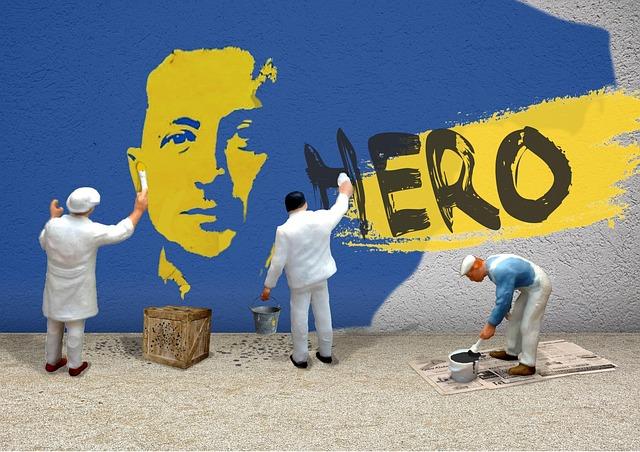Ukrainian President Volodymyr Zelenskyy has confirmed that efforts are underway to negotiate a prisoner exchange with Russia, amidst ongoing tensions between the two countries. In a recent statement, Zelenskyy emphasized the importance of securing the release of Ukrainian detainees, highlighting the humanitarian and diplomatic dimensions of the talks. The development marks a significant step in the complex and protracted conflict, as both sides navigate delicate negotiations in pursuit of a potential agreement.
Zelenskyy Confirms Ongoing Negotiations for Prisoner Exchange with Russia
Ukrainian President Volodymyr Zelenskyy has confirmed that efforts to facilitate a prisoner exchange with Russian authorities remain active amidst ongoing regional tensions. Speaking during a recent briefing, Zelenskyy emphasized the humanitarian importance of these negotiations, highlighting the government’s commitment to securing the safe return of detained Ukrainians. The talks, which have been described as complex and sensitive, aim to address the status of both military personnel and civilians held on either side.
Key aspects of the negotiations include:
- Identification and verification of prisoners eligible for exchange
- Coordination between military and diplomatic channels
- Ensuring medical and legal support for returning detainees
- Maintaining transparency with families and the public
| Category | Details |
|---|---|
| Negotiation Status | Ongoing, with scheduled future sessions |
| Number of Prisoners | Estimated in the dozens |
| Involved Parties | Ukrainian & Russian officials, international mediators |
| Expected Timeline | Undisclosed, dependent on verification processes |
Key Challenges and Strategic Considerations in Ukraine Russia Prisoner Talks
Negotiating a prisoner exchange between Ukraine and Russia presents multifaceted challenges, not least because of the profound political and military tensions shaping the conflict. Key obstacles include verifying the identities and statuses of detainees, ensuring transparent communication channels, and overcoming mutual distrust. Both sides face intense domestic pressures, where public opinion and nationalistic rhetoric often limit negotiators’ flexibility. Furthermore, the humanitarian aspect complicates matters: securing the safe and humane treatment of prisoners during transfer is a critical concern for international observers and human rights organizations.
Strategically, Ukraine must balance the urgency of reclaiming its citizens with broader geopolitical implications. The process demands careful calibration between demonstrating goodwill and maintaining leverage in ongoing diplomatic engagements. Some crucial considerations on the table include:
- Verification Protocols: Establishing clear criteria for confirming prisoner identities to avoid misunderstandings.
- International Mediation: Utilizing neutral parties to facilitate trust and adherence to agreed terms.
- Timing and Phasing: Potential staged releases to build confidence gradually.
| Challenge | Strategic Response |
|---|---|
| Mutual Distrust | Third-party mediation and verification |
| Political Pressure | Careful messaging and phased implementation |
| Security Risks | Strict protocols for transfer and monitoring |
Experts Advise Transparency and International Mediation to Ensure Successful Exchange
Experts emphasize that openness throughout the negotiation process is paramount to building trust between Ukraine and Russia. Transparency can prevent misinformation and foster public support, which is critical given the sensitive nature of prisoner exchanges amid ongoing conflict. Analysts stress that both parties should openly share verification procedures and criteria for the exchange to avoid last-minute disputes and complications. Independent observers have been recommended to monitor the process, ensuring adherence to international laws and human rights standards.
Additionally, international mediation is widely regarded as a key factor in facilitating a successful swap. Mediators from neutral countries or international bodies can bridge gaps between conflicting interests, helping to de-escalate tensions and propose fair terms. Proposed mediators often come equipped with diplomatic experience and credibility, essential for ensuring compliance from both sides. Here is an overview of potential mediators and their roles in such exchanges:
| Mediator | Role | Region |
|---|---|---|
| International Committee of the Red Cross | Monitoring conditions and coordinating logistics | Global |
| United Nations Envoy | Facilitating dialogue and legal compliance | Global |
| Neutral European States | Providing diplomatic channels and guarantees | Europe |
- Transparency ensures public trust and accountability.
- International mediation brings objectivity and balanced oversight.
- Third-party monitoring reduces the likelihood of breaches or mishandling.
To Wrap It Up
As talks continue amidst ongoing conflict, Ukraine’s efforts to negotiate a prisoner exchange with Russia highlight the complex and human dimensions of the war. Both sides remain cautious, with the fate of detained individuals hanging in the balance. The international community will be watching closely as developments unfold, underscoring the broader challenges of achieving progress in a deeply entrenched and volatile situation.




